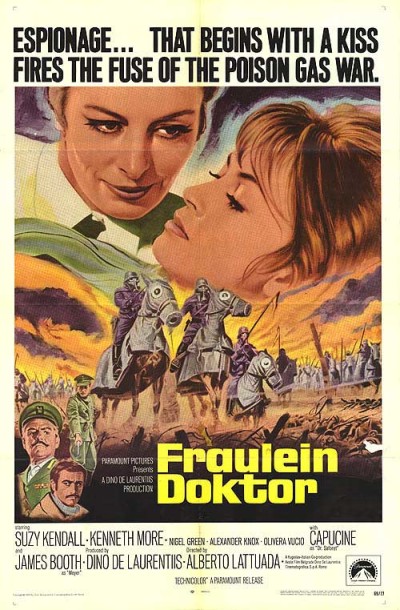★★★½
“Germany calling…”
 There’s a lot going on in this World War I spy thriller: probably a little too much, though it’s still generally interesting. The titular character – I wouldn’t go so far as to call her a heroine, for reasons that will become obvious – is a nameless German spy, whom we first see coming ashore at the British naval base of Scapa Flow. Her two male associates are captured, with Meyer (Booth) being “turned” by British intelligence officer, Colonel Foreman (More). Meyer reveals the fraulein’s mission is to find out on what boat Lord Kitchener will be leaving the base, so it can be attacked. Despite More’s desperate efforts, the plan succeeds and Kitchener is killed. That’s not the first time she has caused problems: in a flashback, we see her seducing French scientist Dr. Saforet (Capucine), in order to steal the secret of a dreadful new chemical weapon. Meyer, now a double-agent, is sent back into Germany with the aim of killing her, and appears to succeed. However, that’s just a ruse, so the not-so-good doctor can complete her biggest mission: organizing a raid on Allied headquarters to steal their defense plans, in advance of a massive German push.
There’s a lot going on in this World War I spy thriller: probably a little too much, though it’s still generally interesting. The titular character – I wouldn’t go so far as to call her a heroine, for reasons that will become obvious – is a nameless German spy, whom we first see coming ashore at the British naval base of Scapa Flow. Her two male associates are captured, with Meyer (Booth) being “turned” by British intelligence officer, Colonel Foreman (More). Meyer reveals the fraulein’s mission is to find out on what boat Lord Kitchener will be leaving the base, so it can be attacked. Despite More’s desperate efforts, the plan succeeds and Kitchener is killed. That’s not the first time she has caused problems: in a flashback, we see her seducing French scientist Dr. Saforet (Capucine), in order to steal the secret of a dreadful new chemical weapon. Meyer, now a double-agent, is sent back into Germany with the aim of killing her, and appears to succeed. However, that’s just a ruse, so the not-so-good doctor can complete her biggest mission: organizing a raid on Allied headquarters to steal their defense plans, in advance of a massive German push.
It’s refreshingly grey in terms of morality. Neither side comes off as occupying the high ground, and there’s very much a sense of grubby necessity. For instance, when the agent is being presented with a medal for her role in killing Kitchener, the presenting German officer refuses to shake her hand, because he considered Kitchener a fellow officer as well as a friend, and his death was “cheating”. But they are perfectly happy to use her talents: when the idea of sending a woman in is questioned, her commander replies, “Why not a woman? She has imagination, precision, courage beyond any man on any battlefield. She has only two weaknesses: traces of pity and grains of morphine.” The latter adds an extra wrinkle in her final undercover role, as a nurse on a Red Cross train, heading to the front, and she has no reluctance in using her body to achieve her goals – whether with men or women. Kendall gives a solid performance, and I was surprised to discover this was inspired by a real person, Elsbeth Schragmüller, whose identity as “Fraulein Doktor” was not revealed until almost 30 years after the end of WW1. Details of her actions are still sketchy, offering the makers a blank canvas on which to paint: no evidence she was a bi-sexual drug-addict, for instance!
As noted, there’s too much going on here. The mission to kill Kitchener could have been an entire movie in itself, as could the theft of the chemical weapon, but instead, these are galloped through at an over-anxious pace. The finale then seems to forget about its leading lady entirely, heading off in an completely different direction, depicting the German attack, both with conventional weapons and poison gas, and the effects on the Allied troops. Shown below, it is truly a nightmarish sequence of epic proportions, enhanced by Ennio Morricone’s discordant score: I believe the Yugoslav army supplied military extras, and that ups the ante considerably. It makes for a grim, rather than rousing finale, bringing home to the fraulein, the responsibility of what she has done. I can see why it was a commercial flop and has largely been forgotten, yet despite its flaws, it deserves a better fate than obscurity.
Dir: Alberto Lattuada
Star: Suzy Kendall, Kenneth More, James Booth, Capucine




